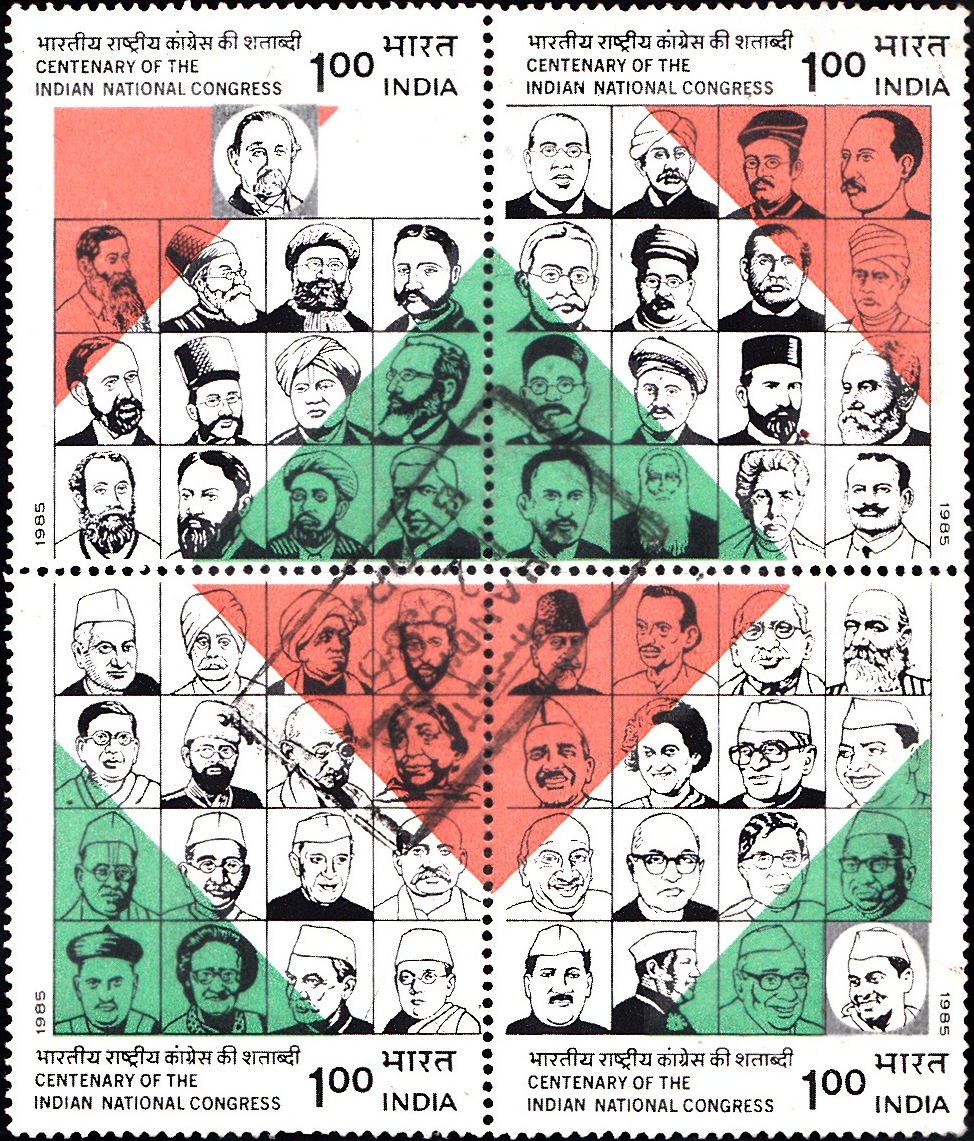
Indian National Congress
Complete Set of 4 nos of postage stamps on the Centenary of the Indian National Congress, an Indian political party :
 Issued by India
Issued by India
Issued on Dec 28, 1985
Issued for : The Department of Posts is happy to bring out a set of commemorative postage stamps on the Centenary of the Indian National Congress.
Description of Designs : The se-tenant set prepared by India Security Press, Nashik Road, based on a design by C.R. Pakrashi, presents a composite picture, depicting the portraits of A.O. Hume & 60 Congress Presidents starting from W.C. Bonnerjee, to the present President, Shri Rajiv Gandhi. The First Day Cover has been designed by C.R. Pakrashi. The cancellation has been designed by Nenu Bagga.
Type : Se–tenant Block of 4 Stamps, Postal Used
Colour : Multi colour
Denomination : 100 Paise each
Overall size : 9.66 x 8.12 cms.
Printing size : 9.66 x 8.12 cms.
Perforation : 14 x 14
Paper : Unwatermarked adhesive stamp paper
Number printed : 15,00,000 each
Number per issue sheet : 12
Printing process : Photogravure
Printed at : India Security Press
About :
- The Indian National Congress was founded in 1885 and in the same year, the first session was held in Bombay under the Presidentship of Shri W.C. Bonnerjee. The illustrious sons of India like Dadabai Naoroji, Surendra Nath Bannerjee and Madan Mohan Malaviya laid the foundation of this organisation.
- From the very beginning, the aim of the Congress was to establish Parliamentary institutions in the country. Renowned Constitutional experts like Dadabai Naoroji, Surender Nath Bannerjee and Gopal Krishan Gokhale, worked untiringly for setting up Parliamentary system of Government and for the growth of a secular, multilingual and multi-religious nationalism. Bal Gangadhar Tilak, Aurobindo Ghosh, Lajpat Rai and Bipin Chandra Paul were the first to adopt the posture of radical nationalism and invoked their countrymen to adopt a more dynamic plan of action. Lok Manya Tilak was the first to declare “Swaraj is my birthright”. In 1929, Jawaharlal Nehru presided over the Lahore session of the Congress. In this Session, the Congress declared complete freedom as its ultimate goal. During the Civil Disobedience Movement in 1930-31 and 1931-32, the Indians undertook agitations on the appeal from Congress and these movements shook the foundations of the foreign rule in India.
- The Father of the Nation, Mahatma Gandhi could feel the pulse of the nation. He asserted that to achieve freedom, it was essential to create political awakening among the masses and train them for a struggle through non–violence against the foreign domination. Thus, non-violence became the basic creed of the Congress. The historic Karachi Session of Congress in 1931 was held under the Chairmanship of Vallabh Bhai Patel in which the famous resolution of fundamental rights was adopted.
- In the Lucknow Session 1936, Nehru formulated the foreign policy for the country based on working for peace and freedom, support for freedom struggle elsewhere and raising our voice against colonialism.
- In the historic meeting of All India Congress Committee, held in Bombay in 1942, presided over by Maulana Abul Kalam Azad, Mahatma Gandhi gave the slogan ‘Do or Die’ and people of India stood as one force to fight the British Rule. Their struggle bore fruit in 1947 and India attained the long cherished independence.
- Smt. Indira Gandhi as Congress President in 1959 and from 1978 to 1984 worked for the cherished goal of a socialistic society. Decisions of her Government like Nationalisation of Banks and insurance companies, abolition of privy purses etc. were all aimed at removing economic disparity and increasing social control over the means of production and distribution. Great leaders have nourished and contributed to its growth and maturity.



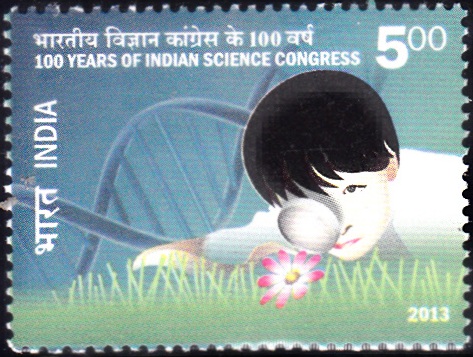
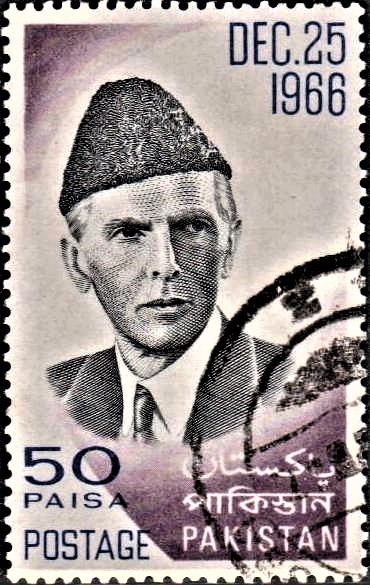
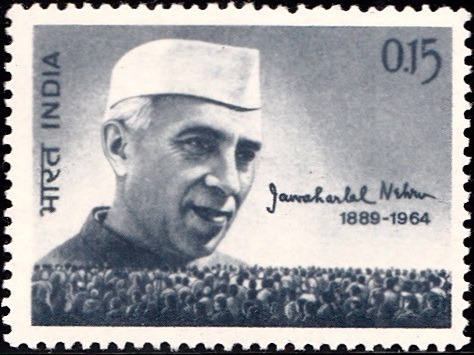
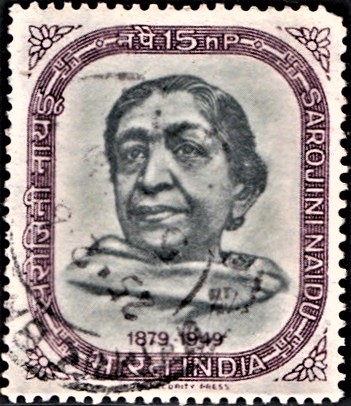
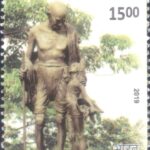
Please advise the list of personalities which can see on the INC centenary stamp.
[…] 1927 he joined Indian National Congress and started playing an active role in Khadi Movement and upliftment of Harijans. He was arrested […]
[…] He worked as a Honorary Magistrate during 1945-51. Though his political career started with the Indian National Congress, he was soon attracted towards the ‘Socialist’ stream of thought, and joined the Samyukta […]
[…] advent into politics began in 1957, when she won the elections to the Lok Sabha on a Congress ticket. She went on to win several elections to the Lok Sabha, Rajya Sabha, as well as State […]
[…] and 1895, the first Asian to be a British MP. Naoroji is also credited with the founding of the Indian National Congress, along with A. O. Hume and Dinshaw Edulji Wacha. His book “Poverty and Un–British Rule in […]
[…] the offer could fructify, Justice Mahajan was made a member of the Radcliffe Commission as an Indian National Congress nominee. As a member of the Commission, he made a momentous contribution, by persuading Lord […]
[…] graduation. He came under the influence of Mahatma Gandhi when the famous Nagpur Conference of the Congress was held and joined the Non-Cooperation Movement in 1920. Thereafter he immersed himself in freedom […]
[…] was living at Kottar, people benefited from his scholarly attributes. He was also associated with Indian National Congress in the year 1920. He was a strong supporter of […]
[…] School in Puducherry, and his political career dates from his student days by participating in the Congress Conference held at Chennai in 1927-28. His urge for nationalism made him think of Puducherry’s […]
[…] Patrika’. Thereafter, the notion of Quit India Movement was started on 14th July, 1942, when the Congress Working Committee approved a resolution which declared that ‘the immediate ending of British rule […]
[…] women to the U.S.A. for studies. He visited England, France and Germany. In 1895, he attended The Indian National Congress held in Pune as the representative from Mumbai. In 1899 he attended the International Conference of […]
[…] from being an industrialist, Birla was also involved in politics. He joined the Congress Party in 1984 as a life member, being elected to the Rajya Sabha the same year nominated by the Congress […]
[…] August 8, 1942, the All-India Congress Committee adopted a resolution sanctioning “the starting of mass struggle on non-violent […]
[…] of having directed the affairs of the three most important political parties in the country – The Indian National Congress, The All India Muslim League and the Khilafat Movement. A devout muslim and a staunch patriot, he […]
[…] the establishment of the Indian National Congress in 1885, the muslim leaders saw through the game of “national” movement and warned their people […]
[…] September, 1939, events moved fast and the intransigence of the Congress increased. There was no alternative for the Muslims but to demand partition of the country which […]
[…] and intelligent advocacy, he ultimately succeeded in getting the Pakistan idea accepted by the Indian National Congress – a predominantly Hindu political organisation – as well as the British […]
[…] Before he could do anything tangible, young Kanshi came into contact with freedom fighters and Congress leaders of those days. He had witnessed the famous Delhi Darbar held in December, 1911, when the […]
[…] and Pandit Govind Ballabh Pant were his college-mates. Inspired by Lokmanya Tilak, he joined the Congress. A close associate of Mahatma Gandhi and Jawaharlal Nehru, he was the treasurer and member of the […]
[…] Committee he submitted a report on agrarian distress in the State. He was an active member of the Congress Working Committee and the Congress Parliamentary […]
[…] its British masters successfully. This brought him recognition as a potential tribal leader and the National Congress admitted Laxman Nayak into its fold. During the course of his training in Naupat training centre […]
[…] of Dhenkanal, Talcher and Rampur etc. Dr. Mahtab was a Member of the Working Committee of the National Congress and later in 1942 he was imprisoned for speaking publicly against the British Raj. On his release […]
[…] Chairman of the Congress Parliamentary Sub-Committee in 1936 and ably guided the functioning of the Congress ministries in various provinces. An active participant in the Individual Satyagraha in 1940, he […]
[…] only fifteen when he left studies at the call of Mahatma Gandhi and became an active member of the Indian National Congress. He participated in the Civil Disobedience and Quit India Movements and was imprisoned several […]
[…] 1927, he joined the Congress Party and actively participated in the movement against the Simon Commission. In 1930, when Mahatma […]
[…] During the time of Civil Disobedience Movement (1930-31), Shri Kumaran took active part in the Congress programme like picketing at liquor shops and boycott of foreign […]
[…] the Hind Kushta Nivaran Sangh (Indian Society for the Prevention of Leprosy). As a member of the Congress Party under Gandhiji‘s inspiration, she took part in the Salt Campaign and was arrested in Bombay. […]
[…] was greatly impressed by the ideals of Mahatma Gandhi and the ideologies of the Indian National Congress. He was also influenced by the social reformers of […]
[…] reformer. Mahatma Gandhi named one of the main gates after the Maharshi when the session of the National Congress was held at Ahmedabad, which is on the banks of […]
[…] Dr. D. V. Gundappa, popularly known by his pen-name ‘D.V.G.‘, was born on 17th March 1887 at Mulbagal, Kolar district, Karnataka. Formal education ended at Secondary School level, but he acquainted himself with the Vedas, the classics in Kannada, Sanskrit, Telugu and English, music and dance, and the speeches of Swami Vivekananda and the Presidents of the Congress. […]
[…] imprisonment. However, he was released in 1938 under General Amnesty for political prisoners by the Congress Government. This marked the beginning of his career as a […]
[…] to a movement of “total revolution“, which culminated in establishment of the first non-Congress government of the country in […]
[…] Chandra Samanta started his public life through the activities organised by the Indian National Congress in his locality. He went on to become the President of the Tamluk Congress Committee and remained a […]
[…] from the village Shakarpur in Delhi, he started his public life with the local Congress Committee in 1936, at a time when the freedom struggle was moving towards its crescendo. He was […]
[…] in the freedom movement began in 1928 when, as a student, he attended the Calcutta Session of the Indian National Congress. He joined the Congress Socialist Party four years later and became involved in the Kisan movement. […]
[…] and an Ashram for political and Sanskrit teaching at Bihata. As a recognition of his work for the Congress, he was first elected a member of the UPCC and then of the BPCC and the […]
[…] the Indian National Congress was started in 1885, Salem Vijiaraghavachariar was one of the special invitees. He was a close […]
[…] area of activity. From 1920 onwards for a number of years he was Chairman of the Fatehpur District Congress Committee. During the Non-Cooperation Movement, as Chairman of the Fatehpur Congress Committee he […]
[…] Union Powers Committee, Provincial Constitution Committee etc. He was elected President of Congress in 1948. He served as Governor of Madhya Pradesh from 1952 to 1957. Settled at Hyderabad after […]
[…] of Finance & Home in the interim Ministry formed by the Justice Party in Tamil Nadu after the Congress decided not to form the government even after winning the elections. The Congress, however, formed […]
[…] Govardhanram Tripathi took up an active role in the Indian National Congress during 1902. In 1905, he was elected as the first president of the Gujarati Sahitya Parishad. He […]
[…] the eve of the All India Congress Committee meeting in 1924, Mahatma Gandhi issued an appeal which stated – “I believe in the […]
[…] incursions into politics started with attendance at the Allahabad session of the Congress in 1910. The following year, he became a member of the Allahabad Municipal Board and of the All […]
[…] December 1929, the Indian National Congress declared Purna Swaraj (total independence) as its avowed objective and 26 January 1930 was […]
[…] and boycott foreign cloth. Vedaratnam Pillai at this young age, began to take an active part in the Congress agitations and courted arrest several times. His most outstanding contribution came in 1930. When […]
[…] in Tamil Nadu. He served as MLC from Tiruchengode for 15 years from 1922 to 1936. He joined the Congress movement in 1933. Dr. Subbarayan‘s initial intimacy with the Justice Party enabled him to be […]
[…] Charan Singh started his political career at Ghaziabad. He formed the Congress Committee at Ghaziabad in 1929 and from 1929 to 1939, was General Secretary of the Ghaziabad […]
[…] aggression on China was in full flow. In response to the appeal for help from Chinese leaders, the Indian National Congress decided that medical teams would be sent and an ‘AID CHINA‘ Committee was formed. Many […]
[…] In 1937 he was elected to Bombay Legislative Assembly and was Minister for Forest in the first Congress Government and later served as the Revenue and Home Minister of Bombay. In 1952, after the first […]
[…] under martial law, it was Swami Shraddhanand who came forward to make arrangements for the Congress session at Amritsar. In this historic session, he introduced the programme for eradication of […]